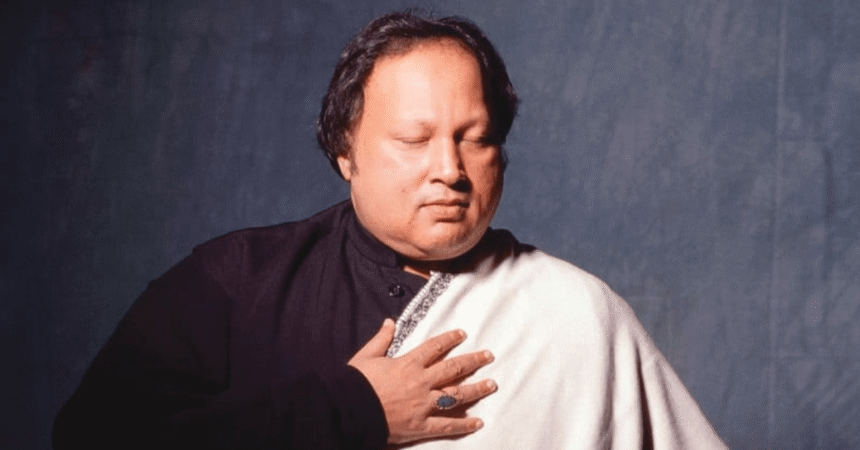After more than three decades, the mesmerizing voice of Nusrat Fateh Ali Khan (NFAK) returns with the posthumous album Chain of Light, released on September 20, 2024, through Peter Gabriel’s Real World Records. This long-awaited collection features four tracks recorded in 1990, reigniting the legacy of the legendary qawwali maestro who passed away in 1997 at the age of 48. The album not only showcases his extraordinary vocal talent but also serves as a poignant reminder of his profound impact on the music world.
The Legacy of Nusrat Fateh Ali Khan
Nusrat Fateh Ali Khan is a name that resonates deeply within the realm of Sufi music and beyond. Born on October 13, 1948, in Faisalabad, Pakistan, he was immersed in a musical family; his father, Ustad Fateh Ali Khan, was a renowned qawwali singer. Nusrat’s early exposure to traditional music laid the foundation for his illustrious career, which spanned over two decades.
Nusrat’s contributions to music are monumental. He is credited with popularizing qawwali music across the globe, transcending cultural and linguistic barriers. His unique ability to fuse traditional Sufi themes with modern musical elements has influenced countless artists in various genres, from pop to classical to world music.
His performances were often characterized by intense emotional depth, a powerful vocal range, and the ability to improvise spontaneously, captivating audiences worldwide. His collaboration with Western artists, including Peter Gabriel, Eddie Vedder, and others, introduced his music to new audiences, further solidifying his status as a global icon.
The Tracks on Chain of Light
Chain of Light comprises four tracks, totaling an evocative 41 minutes. Each song encapsulates the deep emotional and spiritual resonance for which Nusrat is renowned:
- Ya Allah Ya Rehman – The opening track sets a reflective tone, inviting listeners into a space of contemplation and reverence. The powerful invocation serves as a reminder of Nusrat’s deep spiritual roots, allowing the listener to connect with the divine. The intricate harmonium melodies complement his soaring vocals, creating a profound auditory experience.
- Aaj Sik Mitran Di – This track intensifies the emotional experience, with Nusrat’s voice reaching exhilarating heights. The rhythmic patterns of the tabla interweave with Nusrat’s vocal improvisations, creating an electrifying atmosphere that resonates with themes of love and longing. It’s a classic example of Nusrat’s ability to blend traditional qawwali with modern influences, showcasing his artistic evolution.
- Ya Gaus Ya Meeran – Known for its dynamic energy, this piece showcases Nusrat’s unparalleled vocal prowess and improvisational skills. His ability to navigate complex musical phrases and engage with the audience is palpable in this track. The call-and-response format allows for a conversational interplay between Nusrat and the accompanying musicians, reflecting the communal spirit of qawwali.
- Khabram Raseed Imshab – Concluding the album on a lighter note, this track offers a playful and joyous celebration. The upbeat tempo and lively lyrics invite listeners to experience the joy of life and community. This contrast to the more somber themes of the previous tracks underscores Nusrat’s versatility as an artist, capable of evoking a wide range of emotions through his music.
The Recording History
The album was recorded in April 1990 at Real World Studios, coinciding with Nusrat’s collaboration with Canadian producer Michael Brook on the album Mustt Mustt. This period marked a significant phase in Nusrat’s career, as he began to explore the fusion of traditional Sufi music with contemporary sounds.
During these sessions, Nusrat was accompanied by an exceptional ensemble of musicians. His brother, Farrukh Fateh Ali Khan, played a vital role in the recordings, contributing to the rich musical tapestry that characterizes Nusrat’s sound. Tabla virtuoso Dildar Hussain added rhythmic complexity, while a chorus of talented singers, including Mujahid Ali, Rehmat Ali, Rahat Ali, Asad Ali, Ghulam Farid, and Khalid Mahmood, provided vocal support that enhanced the spiritual ambiance of the tracks.
The synergy among these musicians is evident throughout the album, as they collectively create a sound that transcends the sum of its parts. The recordings from this era capture Nusrat at a pivotal moment in his career, when he was beginning to gain international recognition while remaining deeply rooted in his cultural heritage.
Rediscovery and Release
The journey to releasing Chain of Light was serendipitous. The tapes, which had been misplaced in storage for years, were rediscovered in 2021 while Real World Records was reorganizing its archives. This fortuitous finding provided a rare opportunity to share previously unheard material from one of the most revered voices in music history.
Upon announcing the album in June 2024, Peter Gabriel expressed his deep admiration for Nusrat’s artistry. He stated, “What he could evoke with just his voice was beyond remarkable… this album captures him at his very best. It’s truly something special.” Gabriel’s words reflect the profound impact that Nusrat had on those who had the privilege of working with him, emphasizing the timeless quality of his music.
The release of Chain of Light comes at a time when there is a growing interest in world music and a renewed appreciation for the cultural heritage that artists like Nusrat Fateh Ali Khan represent. As listeners seek to explore diverse musical landscapes, this album serves as a vital connection to the past, allowing new generations to experience the power and beauty of Nusrat’s artistry.
Impact on Contemporary Music
The influence of Nusrat Fateh Ali Khan extends far beyond the realm of traditional Sufi music. His innovative approach to qawwali has inspired countless artists in various genres, from world music to rock and beyond. The fusion of traditional sounds with contemporary elements paved the way for other artists to experiment with cross-genre collaborations, enriching the global music landscape.
Prominent figures such as Eddie Vedder, of Pearl Jam fame, have cited Nusrat as a significant influence. Vedder’s collaboration with Nusrat on the track “The Long Road” exemplifies how Nusrat’s music transcended cultural boundaries, merging rock sensibilities with traditional South Asian sounds. This blending of genres continues to inspire artists around the world, encouraging them to embrace diversity in their creative expressions.
Additionally, Nusrat’s music has found its way into film soundtracks, further amplifying his reach. His songs have been featured in various films, introducing his mesmerizing voice to audiences who may not be familiar with Sufi music. This crossover appeal highlights the universal themes present in his work—love, spirituality, and the search for meaning—making his music relatable to people from all walks of life.
Cultural Significance of Qawwali
Qawwali music, the genre in which Nusrat Fateh Ali Khan excelled, has deep cultural and spiritual significance within the Sufi tradition. It serves as a medium for expressing devotion and connecting with the divine, often performed at Sufi shrines and during religious gatherings. The repetitive structure of qawwali allows for a trance-like state, encouraging listeners to immerse themselves in the music and the message.
Nusrat’s contributions to qawwali have elevated the genre to global recognition, demonstrating its rich cultural heritage. By introducing this traditional music to wider audiences, he helped bridge the gap between Eastern and Western musical traditions. This cultural exchange fosters greater understanding and appreciation of diverse artistic expressions, paving the way for future collaborations.
Moreover, the revival of Nusrat’s music through albums like Chain of Light serves as a reminder of the importance of preserving cultural heritage. In an increasingly globalized world, where cultural homogenization poses a threat to unique traditions, the celebration of artists like Nusrat Fateh Ali Khan reinforces the value of cultural diversity.
Emotional Resonance
One of the defining characteristics of Nusrat Fateh Ali Khan’s music is its emotional depth. His ability to convey profound feelings through his voice resonates with listeners on a personal level. Each note and phrase carries the weight of human experience, whether it be love, longing, or spiritual ecstasy.
The tracks on Chain of Light exemplify this emotional resonance. Listeners often describe experiencing a sense of catharsis when engaging with Nusrat’s music, as it taps into universal themes that transcend linguistic and cultural barriers. The power of his voice has the ability to evoke tears, joy, and contemplation, creating a shared emotional experience among diverse audiences.
In an age where music is often consumed in fleeting moments, Nusrat’s work encourages a deeper engagement. The complexity and richness of his compositions invite listeners to explore the nuances of their emotions, fostering a connection that goes beyond mere entertainment.
Conclusion
The release of Chain of Light is a significant event for music lovers, particularly those who cherish Nusrat Fateh Ali Khan’s work. This album not only revives his hypnotic voice but also serves as a reminder of the cultural and musical legacy he left behind. As fans around the world celebrate this long-lost gem, the album stands as a testament to the enduring power of his music.
Nusrat Fateh Ali Khan’s influence continues to resonate across generations, inspiring artists and listeners alike. Chain of Light not only showcases his extraordinary talent but also reaffirms the timelessness of his music. In a world that is ever-changing, his voice remains a constant source of inspiration, inviting us to connect with our shared humanity through the art of sound.







